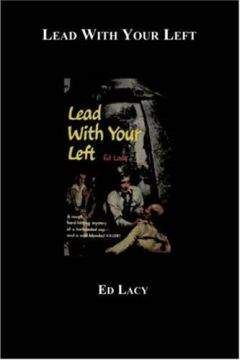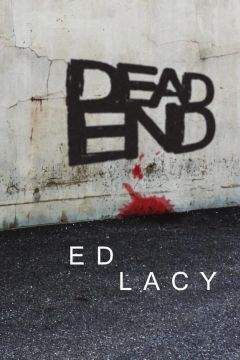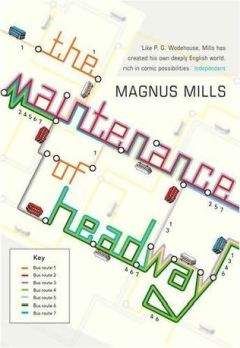Ed Lacy - Lead With Your Left
На сайте mybooks.club вы можете бесплатно читать книги онлайн без регистрации, включая Ed Lacy - Lead With Your Left. Жанр: Прочее издательство неизвестно,. Доступна полная версия книги с кратким содержанием для предварительного ознакомления, аннотацией (предисловием), рецензиями от других читателей и их экспертным мнением.
Кроме того, на сайте mybooks.club вы найдете множество новинок, которые стоит прочитать.

Ed Lacy - Lead With Your Left краткое содержание
Lead With Your Left читать онлайн бесплатно
“Indeed I do. Like I kept telling poor Martha, what that had to do with her I couldn't see. But those smug sisters of hers out in Los Angeles—well!”
“Of course Uncle Sal was before my time and I'm a distant relation, but I remember hearing about him. Went to jail, didn't he?”
“Died in the electric chair, he did!” the biddy said, her voice full of enjoyment at finding a new listener for old gossip. “Got himself in trouble during Prohibition, but then everybody was making bootleg booze. You can bet I used my tub for something besides taking a bath. Sal was just unlucky, got hisself mixed up with gangsters, had to kill one.”
“Did you know Uncle Sal?”
There was a slight drawing up of a lot of flabby bosom. “Me? I did not. Martha didn't buy this house till many years after her son died. But she told me lots about him. Always good to his mother, a fine son.”
Tin not up much on this line of the family. Are there any other members around here?”
“They're all in California, well-off I hear, but wouldn't ever send Martha a Christmas card or nothing, on account of Sal's trouble. She never told me of any family in... where did you say?”
“Michigan. Mother was some kind of cousin to Mr. Kahn's brother-in-law. Pretty complicated. Was Uncle Sal her only child?”
“Sure was, not counting two miscarriages before Sal. Poor Martha, husband dead, son dead, and her sick and alone and those snooty relatives out there in the sunshine never sending her a card. You can bet she always remembered them with cards. Wasn't for the money she got, she'd have starved.”
“If she owned this fine house she must have been comfortable.”
The gash opened wide. “Hummp! First of every month, regular as the calendar, there was a registered letter with two hundred dollars—always ten twenty-dollar bills. I know. The last few months when the poor woman was confined to her bed and only had me to look after her, she opened the letters and I saw the money. But she never would say who it was from.”
“Maybe from California?”
“In a pig's... eye! I did notice the return addresses on the last two letters being I had to sign for them. Different names and addresses and both of them phony. Yes, sir. I was such a decent friend to poor Martha I went over to each address, figuring might be a relation who could look after Martha. First time wasn't no such street number, next time wasn't no such party. I asked Martha and she says she had no idea who did send her the money, it just came regular for years.”
“Sounds strange, you'd think she'd know who was sending her money,” I said.
Baggy nodded. “Ask me, she once told me Sal had a partner in his business but Sal didn't see no sense involving him in this trouble. Ask me, I'd bet this here partner maybe agreed to look after Martha if Sal didn't talk. Yes, sir.”
“Didn't Aunt Martha know who this partner was?”
“Said she never knew.”
“The letters stop when Aunt Martha died?”
“Sure, soon as the postman returned the next one as deceased, they stopped.”
“Can you recall the two false names and addresses you mentioned? Or the name of Aunt Martha's doctor?”
“Now that was over six years ago and... Say, you ask a lot of questions for a kid.” The clown mouth became a rough, heavy line as she stepped back and slammed the door, shouting, “I bet a fat dollar you're the son of one of them California bitches! Scoot before I take a broom to you!”
I walked back toward the subway, stopped for a cup of coffee and toast, picked up a paper and read about Wales. He made the fifth page. There were pictures of him and Owens, taken years ago, and nothing I didn't know in the news story. I had a second cup of Java and a hunk of pie which was pretty good.
Two hundred dollars a month, $2,400 a year for Mrs. Kahn, over how many years? Somebody had to be in an awful tight spot or grateful as hell to shell out that kind of dough. And it would have to be a big operator to pay that sort of green. Wales? What would he be grateful for? What could old lady Kahn possibly have on him? Maybe the biddy was only repeating gossip, had the story screwy? I wondered if it was worth while going back and flashing my shield at her. But I had a hunch she'd told me all she knew.
I made some notes in my book, decided against more pie, and left. The other address was the garage where Sal ran his still, where he killed Boots Brenner in 1930. This was in another part of Brooklyn and traveling in Brooklyn is like going over a giant obstacle course. After I'd paid three carfares I was getting low on money—I'd been so sore at Mary I hadn't asked her for a couple of bills—so I flashed my badge in the last bus. The baldy driver asked, “Young to be a cop, aren't you?”
“See the badge, don't you?” I said, walking by him and sitting down.
So a couple of blocks later this billiard ball-head stops the bus to call over a beefy beat patrolman. I was embarrassed as hell and stepped off the bus with him rather than cause more of a scene. I showed him my badge and Police Benevolent Association card, pulled back my shirt so he could see my gun. He said, “I don't want to make no mistakes, one way or the other. First off you hand me your gun, butt first, all nice and easy. Then I'll put through a call at my box and we'll see. You do look young and short but no hard feelings if I'm wrong. Understand?”
I handed this big bum my gun, telling him, “Be careful it doesn't go off and you shoot yourself.” I gave him a dime and told him to save time by using a regular phone to call my precinct. When he finally got Reed on the phone and described me they must have made some crack because the big dumb ox laughed and said, “Looked more like he'd be packing a zip gun than a badge. Thank you, Lieutenant.” I knew the ribbing I was in for when I reported back to duty.
The cop gave me my gun, said he was sorry but I must have stood on my toes when I took the physical.
“That's right. And I borrowed my old man's beard too. Look, maybe you can do me some good for a change. Know how to get to this address?”
“You aren't three blocks from it. Dye plant. On my beat when I'm working radio car. Good people at Christmas.”
“Dye plant? Was it ever a garage?”
“I been in this precinct for five years and it's been a dye plant all that time. New building. I think before that it was an empty lot and a ruin. Tell you, Detective”—he stumbled over the word—“seems to me I heard a kid was hurt playing in the old building years ago and they had to put a watchman in. An old duffer in the neighborhood. Still works as a night watchman for the dye company. Old George Davis. He might be able to tell you about it being a garage. Anything important?”
“Naw, checking a reference. Where's this Davis fellow?”
“When you get to the dye plant keep going a block. You'll see an old brown house that looks like a good wind would carry it away. Can't miss it; same side of the street. Old George lives there. Be working in his garden now. Doesn't hit the sack till noon.”
I said thanks and walked away, knowing the big cluck was staring after me with a puzzled look in his dumb eyes.
The dye plant was one of these one-story efficient-looking buildings, all spick and span. It had glass-brick windows and air conditioning, looked like a big outfit.
The old brown house was exactly that and air-conditioned in a different way. It sat back from the sidewalk with a whitewashed flagpole in the center of a small lawn just starting to look green. I followed a broken walk around the house to a large garden. A plump old gent with a fat nose and a shabby derby on a lot of gray hair was digging up the ground with a pitchfork. He had on a worn flannel shirt and his old work pants were held up by wide fireman's suspenders. He was stinking up the sunshine with a battered pipe.
“Mr. Davis?”
He nodded.
I showed my badge as I told him, “Detective Dave Wintino, 201st Squad. And I've had about all the cracks I want about my looking young. If you can spare a few minutes, I'd like to chat with you.”
“I got plenty of time,” he said and his voice had a kind of whine you find in lots of big old men. “It's a fact you look young. What's this all about?” He leaned on the pitchfork the way a real farmer does—I guess.
“You remember when the dye plant was an empty garage and a vacant lot?”
“Sure do. I was always for raising tomatoes in that lot but between the kids playing ball and the rocky soil I got no place.”
“Were you around when they had the shooting in the lot?”
He patted his crazy hat. “Sure was. I mean I wasn't at the actual shooting or when they found the body, but I was there when the cops were. Now that was way back in nineteen—”
“Nineteen-thirty.”
He nodded. “Yep and times was real bad. Garage had been standing empty maybe two, three years when one day I seen two men working in it. Never knew exactly what they was doing, all very quiet. So didn't surprise me none when it turned out they was bootlegging. Sometimes when I'd be working my tomatoes in the lot on Sundays, or late in the afternoons, I'd see them. The one they killed in prison and the other.”
“The other—what did he look like?”
Davis relit his pipe before he said, “One thing I got to hand you cop fellows, you never give up. Like I told that other detective, it's been a—”
“What other detective?”
“Tall one that was handling the case. Even after they give the fellow the chair and the garage was just an old building with busted windows—them darn kids around here—why, every now and then this dick would still come around and look through the building. Although there wasn't anything to see that I knew of.”
“Was the detective named Owens or Wales?”
“Hard to say, I'm not much on names. Fact is, I'm around here a good deal, always have been. Some men like bars and shows, me—give me a hunk of ground. Even while the trial was going on and then when the one man was waiting to go in the chair, many is the time I'd see this detective just sitting in his car, watching the empty garage. Thought to myself, it don't make sense to...”
I opened the paper to the story on Wales' death, showed him the two pictures. He touched Wales' photo with his pipe. “That's him. He used to talk to me a good deal, at first. Kept asking like you just did, what this other bootlegger looked like, the one they never did catch on with. Like I say, they was pretty quiet about what they was doing, so I only saw him maybe a few times. Slim young fellow with dark hair and a thin mustache. Always wearing sunglasses, even when it was a dull day. Of course I ain't so sure of this now—it was twenty-six years ago.”
“Yeah, too long ago,” I said, trying to think. “How often did Wales come out to look at the garage, or watch it?”
Davis shifted his feet on the pitchfork. “Hard to say. For a time seemed like he Was there every time I turned around. Of course now I had a kind of job, so I couldn't say if he was there during the day or not. After a time, a few years, we didn't talk much, just nod at each other. Sometimes he'd ask if I'd seen anybody around searching the place. I never did. That was right before the war when a kid fell through the rotten floor and got hurt, when they took me on as watchman to keep the brats from—”
“Wait a minute,” I cut in. “Before the war—you mean Wales was still snooping around here in 1941, almost a dozen years after the killing?”
“Yep, he was around up till the time they tore it down. Not so often, I'd see him one day and maybe not again for a month or more. He'd step inside and tell me to go out and look at my plants. But sometimes I'd watch him through a busted window—he'd be standing in the center of the garage and stare at the walls for a long time. Only looking. After a while he'd go to one wall or corner, start hunting. Was nothing in there, the police took out all the machinery when they made the arrest. Building was torn down in 1946 but tm account of the shortage of building materials they couldn't start building again till... oh... I'd say it was 1949, when they put up the dye plant. Took me on as watchman again, fine people to work for too.”
“Wales say anything when they took the old garage down?”
“No, sir, he'd given up by then.”
“Can you recall when he gave up?”
“Just about. It was early in '46, say around April. I remember because I told him about the building coming down and he slipped me a few bucks, says I should go to the movies, take the day off. He said he'd be there all day. I didn't go to no movie, I went home and went to bed. Like I said, he wasn't the kind of man to talk much. Around six in the evening I come back and he says, 'Now they can knock this wreck down. I'm done.' I says to him, “You find what you been looking for?' And he give me a blank look and asks, 'Who says I was looking for anything?' One thing, he wasn't carrying a package or anything when he left.”
“He could have put a bag in his car while you were in the sack.”
“Nope, he didn't have his car that day. Remember because it was raining hard and I watched him walking all the way over to Eastland Avenue to catch a trolley. Tell you the truth, youngster, I kind of poked around myself at times, thought maybe it was money these bootleggers might have hidden. But I gave it up after a couple looks. Like I said, wasn't nothing but four rotten walls. Didn't see the paper today, what's this Wales done now?”
“He was shot to death. Pops, did you ever see the other man, this Owens, poking around here? He was a detective too.”
“No, just Wales. Don't recall the other face. 'Course at the time of the shooting, whole block was full of detectives. Trampling all over my tomato plants. Why did Wales shoot hisself?”
“He didn't, he was murdered,” I said, jotting down the dates in my notebook.
“Murdered? All you read about these days. I say these teenagers should be given a taste of the strap and then—”
“I want you to do me a favor, don't talk about this. Don't even tell anybody you remember Wales. You see what you've just told me can be nothing, then again it might help us solve Wales' murder.”
“I won't say a mumbling word. Don't want to get mixed up in nothing. Not me. Say I sure got to read the morning paper now.”
I wanted to tell him to keep his trap shut even if that beat cop happened to ask what I wanted, but that might make the old boy suspicious of me. I wrote my name and the squad phone on a notebook page, gave it to him. “If you think of anything else, even if it doesn't seem important, but anything you haven't told me—anything— give me a ring. If I'm not there, leave a number where I can reach you. Got a phone?”
Похожие книги на "Lead With Your Left", Ed Lacy
Ed Lacy читать все книги автора по порядку
Ed Lacy - все книги автора в одном месте читать по порядку полные версии на сайте онлайн библиотеки mybooks.club.




